|
|
|
Sort Order |
|
|
|
Items / Page
|
|
|
|
|
|
|
| Srl | Item |
| 1 |
ID:
161235
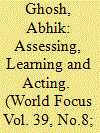

|
|
|
|
|
| Summary/Abstract |
Our environment has been steadily getting worse ever since human beings have begun to evolve on this planet. It has especially become worse after human beings evolved sufficiently to become large populations, exploiting their local environment through complex equipment and tools. Measuring this was not such an easy task. The tools required were not yet ready and neither were our conceptions of the environment detailed enough in their complexity.
|
|
|
|
|
|
|
|
|
|
|
|
|
|
|
|
| 2 |
ID:
161244


|
|
|
|
|
| Summary/Abstract |
With the beginning of anthropocene, the question of sustainability and the challenges it is faced with become critical for human survival in the debate on nature and environmental protection. In this background, few challenges for sustainability are discussed in this paper, especially what may help in striving for sustainable human – nature interactions. Can there be single framework of sustainability and what are its determinants? Can sustainability be ever achieved given the present economic growth pursuit and the social consumerist behaviour of humans across societies and globe? Should the efforts of protecting environment and nature primarily target at achieving sustainability in the contemporary times or vice versa?
|
|
|
|
|
|
|
|
|
|
|
|
|
|
|
|
| 3 |
ID:
161252
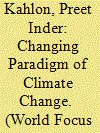

|
|
|
|
|
| Summary/Abstract |
Climate change, a scientific issue, has become a highly debatable and politically motivated issue in last three decades. The Kyoto protocol represents an important milestone in international efforts to address climate change. But it failed to catch up with the changes occurring at global level due to lack of clarity at policy level and division of globe into Annex I and Non-Annex I nations.
|
|
|
|
|
|
|
|
|
|
|
|
|
|
|
|
| 4 |
ID:
161237
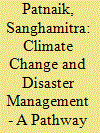

|
|
|
|
|
| Summary/Abstract |
While Climate change is perceived as global problem India is no exception to it. Nearly 700 million people in rural India are directly depending for their livelihood on climate-sensitive sectors such as agriculture, forests, fisheries and natural resources. Climate change has a strong impact on all the natural ecosystems, health and socio-economic systems, as reported by India to the United Nations Framework Convention on Climate Change (UNFCCC).
|
|
|
|
|
|
|
|
|
|
|
|
|
|
|
|
| 5 |
ID:
161250


|
|
|
|
|
| Summary/Abstract |
This study focuses on the erratic climate change and its impact on water shortage in Ladakh region in general and in the city of Leh in particular. The Population of Ladakh depends on snow and glaciers melted water for irrigation and drinking for centuries. As such, many of the socio-cultural and religious practices in the region have evolved in tune with its ecology and environment.
|
|
|
|
|
|
|
|
|
|
|
|
|
|
|
|
| 6 |
ID:
161248
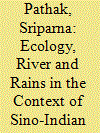

|
|
|
|
|
| Summary/Abstract |
With the world increasingly moving towards a drier, arid and dangerous future, sustainable development of shared resources such as water and natural habitats have become of prime importance. However, these resources do not fall within the geographical or political boundaries of any particular nation state, which makes management completely based on cooperation and diplomacy. India and China both are rapidly developing states and have been playing important roles at the international stage on issues of climate change and sustainable development.
|
|
|
|
|
|
|
|
|
|
|
|
|
|
|
|
| 7 |
ID:
161242
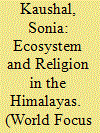

|
|
|
|
|
| Summary/Abstract |
The contribution of human in changing and quite often destroying biodiversity is a matter of fact. The world community is fast becoming aware of this anthropogenic menace and beginning to take necessary measures in the form of sustainable Development Goals. It happened because of the ‘greed’ replacing ‘need’ and the biodiversity of the weak, marginalized, ruled and enslaved was usurped by the powerful, imperial and colonial masters. Even after these area became autonomous and independent, the excessive exploitation of the biodiversity resources continued uninterrupted.
|
|
|
|
|
|
|
|
|
|
|
|
|
|
|
|
| 8 |
ID:
161236
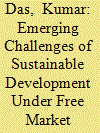

|
|
|
|
|
| Summary/Abstract |
The pragmatism of globalization of knowledge and technology has generated an over optimism around the globe. It has generated an atmosphere of excitement of instant economic growth. It is being regarded substantively as the growing interdependence and interconnectedness of the world that is the part of the logic of modernity. It is expected to create unprecedented new opportunities for sustainable development.
|
|
|
|
|
|
|
|
|
|
|
|
|
|
|
|
| 9 |
ID:
161247
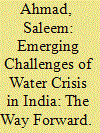

|
|
|
|
|
| Summary/Abstract |
Recently, the world has celebrated World Water Day, on 22 March, is about focusing attention on the importance of water. This year’s theme, “Nature for Water”, explores nature-based solutions to the emerging challenges of water that we face in the 21st century. Environmental damage, together with climate change, is driving the water-related crises we see around the world. Floods, drought and water pollution are all made worse by degraded vegetation, soil, rivers and lakes. When we neglect our ecosystems, we make it harder to provide everyone with the clean water we need to survive and thrive.
|
|
|
|
|
|
|
|
|
|
|
|
|
|
|
|
| 10 |
ID:
161246


|
|
|
|
|
| Summary/Abstract |
The number of slums in India are ever increasing. According to the Census Report (2011), the slum population in India comprises of 22.4 million of the population which is 17.36% of the total population of India. One of the major reasons for this ever expanding slum population is the constant process of urbanisation. Urbanisation of the rural dwellers and migration to the cities creates population deletion in rural areas and bulging of the same in the urban areas.
|
|
|
|
|
|
|
|
|
|
|
|
|
|
|
|
| 11 |
ID:
161240


|
|
|
|
|
| Summary/Abstract |
Ever since the notification of the Scheduled Tribes and other Traditional Forest Dwellers (Recognition of Forest Right, FRA) Act 2006, recognizing the forest land rights and forest based livelihood rights of the Scheduled Tribes and other traditional forest dwellers in 2008, the issue of the implementation of the Act, its impact on forest ecosystem and sustainable livelihood has remained a matter of discussions and debates.
|
|
|
|
|
|
|
|
|
|
|
|
|
|
|
|
| 12 |
ID:
161238


|
|
|
|
|
| Summary/Abstract |
Global warming has become the buzz-word of the twenty-first century discourse on climate change and environment. Global scientists, political leaders from across the world, Non-governmental organizations, civil-society, legal community, and media are breaking their heads to engineer the climate and reverse the ever growing trends of global warmingfor its given consequences. Another approach that is being emphasised and is into practice as well is the concept of sustainable development. However, the scientific and popular debate that ensued over the last couple of decades over the causes and impact of climate change seems to have ignored the subject of demographics that has the main bearing upon every wrong that is happening to the environment.
|
|
|
|
|
|
|
|
|
|
|
|
|
|
|
|
| 13 |
ID:
161249
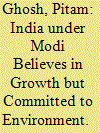

|
|
|
|
|
| Summary/Abstract |
Sustainable development of mankind is not possible without following the three golden Rs of waste management, namely reduce, reuse and recycle. This was Prime Minister Narendra Modi’s message to participants in the Eighth Regional 3R Forum in Asia and the Pacific, being held from April 9 to 12 at Indore. The forum had seen waste management experts from India and abroad who discussed how waste management patterns have changed globally and the growing importance of international cooperation in waste management. Addressing participants of the forum, the Prime Minister said that development was only possible when waste was managed properly.
|
|
|
|
|
|
|
|
|
|
|
|
|
|
|
|
| 14 |
ID:
161253


|
|
|
|
|
| Summary/Abstract |
The US-EPA has estimated a 5% to 10% global increase in the generation of e-waste each year. In 2014, E-waste generated globally amounted to cooling and freezing equipment (17%), Large equipments (28%) small equipments (31%), Lamps (2%), Screens (15%), small IT (7%). Total global e-waste in 2014 was 41.8m tonnes equivalent to 6,000 Eiffel Towers. The top 6 e-waste generating countries included USA (8m tonnes), China (6m tonnes), Japan (4m tonnes), and India (2m tonnes) among others.
|
|
|
|
|
|
|
|
|
|
|
|
|
|
|
|
| 15 |
ID:
161233
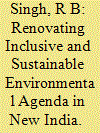

|
|
|
|
|
| Summary/Abstract |
Indian people, academics and policy makers should utilize environment for revitalizing India taking lessons from global and national successful stories. Thinking about the future of planet and life on earth is mentioned in Rachel Carsons’s book entitled ‘Silent Spring’, published in 1962, began with a ‘fable for tomorrow’, depicting story about the use of DDT had caused damage to wildlife, birds, beet, agricultural animals, domestic pets and even human beings.
|
|
|
|
|
|
|
|
|
|
|
|
|
|
|
|
| 16 |
ID:
161245


|
|
|
|
|
| Summary/Abstract |
Consumption is understood as the human act of using up or exploitation of natural resources for survival, comfort and luxury. Man has been consuming natural resources since the earliest of time as it is linked to the existence, survival and development of human race. However, today the term “consumption” encompasses many more things than this. In modern context the term does not include only eating and drinking and often includes things that we choose to do, buy, listen, view, wear etc.
|
|
|
|
|
|
|
|
|
|
|
|
|
|
|
|
| 17 |
ID:
161241


|
|
|
|
|
| Summary/Abstract |
The argument put forward in this article subscribes best to the philosophical debates on ‘politics’ initiated by a French scholar Michael Foucault. This debate on the idea of politics starts with a critical understanding of the term. One has to be skeptical about the larger political scenario both spatially and temporally. This skepticism emerges from a belief that- it is not that everything is bad but certainly everything is dangerous.
|
|
|
|
|
|
|
|
|
|
|
|
|
|
|
|
| 18 |
ID:
161254


|
|
|
|
|
| Summary/Abstract |
In the recent decades, the concept of ‘market environmentalism’ (ME) and the process of ‘neo-liberalisation of nature’ took roots in the discourse of natural resources management. Commercialisation, privatisation, and market mechanisms are replacing public policies vis-à-vis resource governance. Simultaneously, the notion of environmental services has also become a sustained discourse. The movements for establishing human right to water (HRtW) and decentralisation of environmental governance are also on the rise.
|
|
|
|
|
|
|
|
|
|
|
|
|
|
|
|
| 19 |
ID:
161243


|
|
|
|
|
| Summary/Abstract |
Ever since the idea of sustainable development gained a worldwide popularity in 1990s at the backdrop of various development agencies, social movements and concerns about deteriorating environment conditions, limited renewable natural resources and excess demands of human population, much attention on the buzzword “sustainable’’ have been given everywhere. It has been used as one of the most fashionable words by people who have genuinely engaged or with a vested interest in environment or development or simply interested and concerned with various existing issues and challenges.
|
|
|
|
|
|
|
|
|
|
|
|
|
|
|
|
| 20 |
ID:
161239
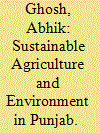

|
|
|
|
|
| Summary/Abstract |
David Ludden, (1999: 19) wrote, “agriculture is civilization at work on the land, humanizing nature and naturalizing the powers that human societies exert upon nature”. Agriculture is an art to obtain food from soil, and it gives humans an opportunity value nature. Agriculture is very fundamental process to the emergence of human society and culture. It is the primary source of income for the majority of the people of India. Agriculture predominantly influences the process and pace of economic development. Indian Agriculture sector contributes 17-18 per cent of the nation’s GDP and employs more than 50 per cent of total workforce in India.
|
|
|
|
|
|
|
|
|
|
|
|
|
|
|
|
|
|
|
|
|